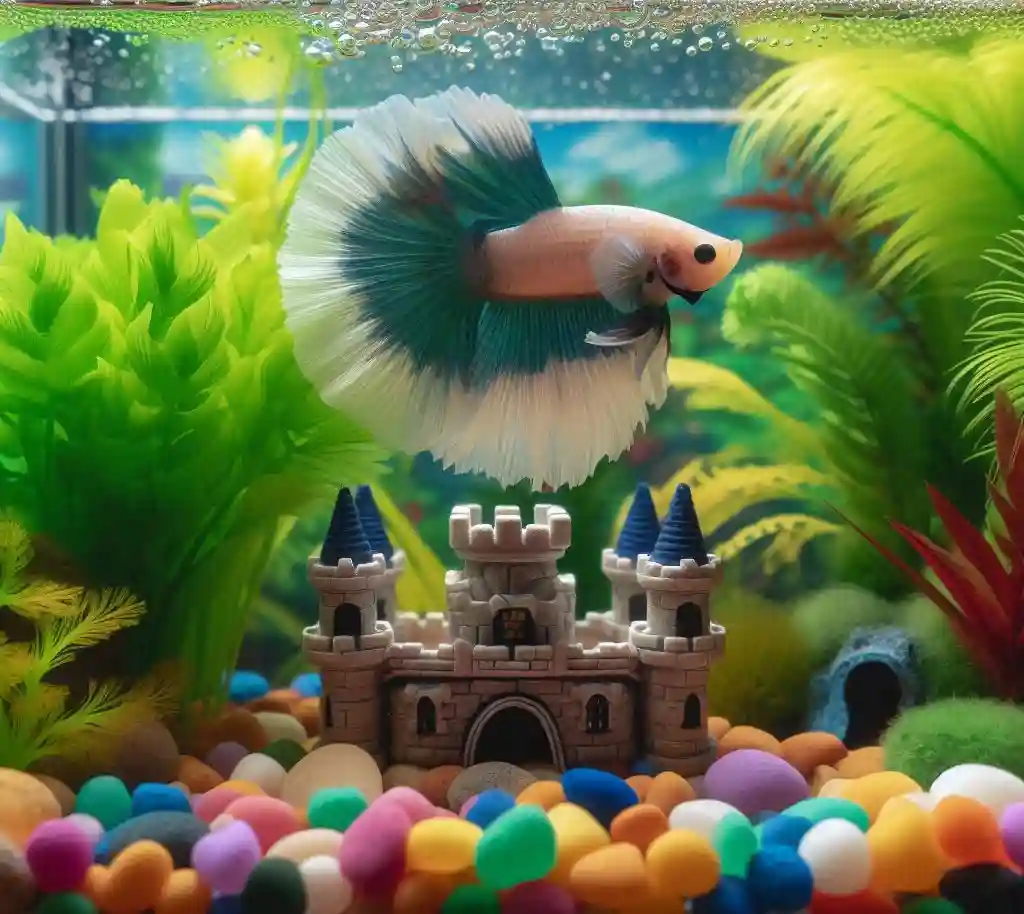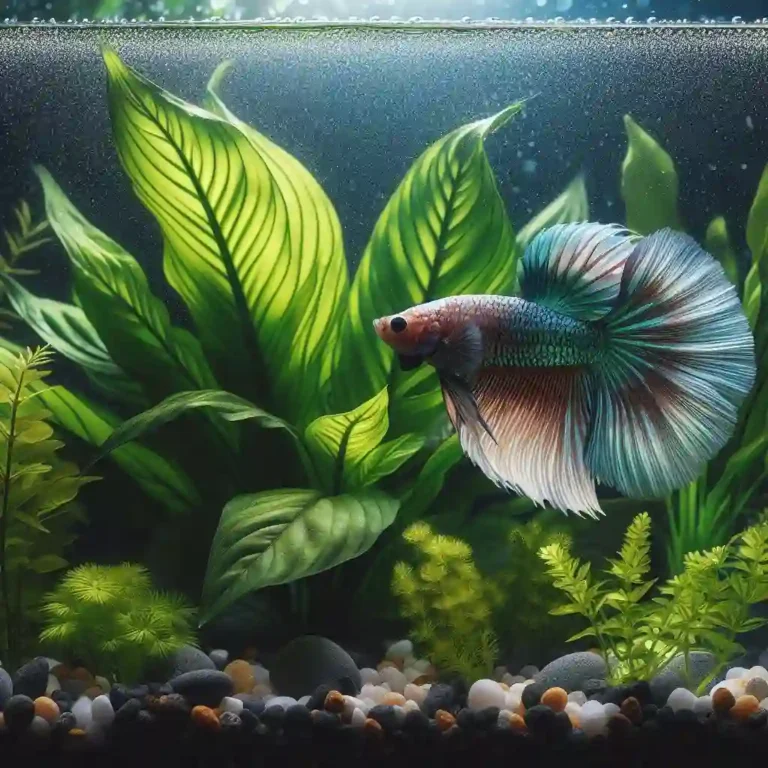Betta Fish Poop Hanging: Causes, Concerns, and Solutions
Betta Fish Poop Hanging: When it comes to caring for your beloved betta fish, there’s nothing more unsettling than noticing that their poop is hanging from the water’s surface.
But what’s causing this unusual phenomenon? Is it a sign of illness, poor water quality, or something else entirely?
In this article, we’ll delve into the possible causes of hanging poop in betta fish to help you get your finned friend back to optimal health.
Betta Fish Poop Hanging: A Quick Guide

Causes of betta fish poop hanging:
- Poor water quality
- Constipation
- Digestive issues
- Certain types of food
- Lack of fiber in the diet
Signs of betta fish poop hanging:
- Stringy or sticky poop
- Constipation
- Difficulty passing stool
How to prevent betta fish poop hanging:
- Maintain good water quality
- Provide a balanced and varied diet
- Ensure adequate fiber in the diet
- Avoid overfeeding
- Perform regular water changes
How to treat betta fish poop hanging:
- Perform a partial water change
- Clean the gravel and decorations
- Add fiber-rich foods to the diet
- Consider a water conditioner or probiotics
The Mysterious Case of Hanging Poop: What’s Going On?
Theories and explanations:
- Surface tension: One possible explanation is that the poop is sticking to the side of the toilet bowl due to surface tension. When poop is deposited into the toilet, it can create a thin film on the water’s surface. If the poop is particularly sticky or has a high water content, it can adhere to the toilet bowl, defying gravity and refusing to drop.
- Air pockets: Another theory suggests that air pockets can form around the poop, causing it to float or stick to the side of the toilet bowl. This can happen when the toilet is not flushing properly, allowing air to become trapped in the bowl.
- Toilet design: The shape and design of the toilet bowl might also play a role. Some toilets have a more curved or angled bowl, which can cause the poop to stick to the sides or hang suspended.
- Poop consistency: The consistency of the poop itself can also contribute to the hanging phenomenon. If the poop is particularly soft or watery, it may not have enough mass to break the surface tension of the water, causing it to stick to the side of the bowl.
- Flush dynamics: The force and direction of the flush can also impact the behavior of the poop. If the flush is weak or uneven, it may not provide enough force to dislodge the poop from the side of the bowl.
What can you do about it?
If you’re experiencing the mysterious case of hanging poop, try the following:
- Use a toilet brush: Gently scrub the affected area with a toilet brush to dislodge the poop.
- Increase the flush power: Check your toilet’s flush setting and adjust it if necessary to ensure a more powerful flush.
- Use a toilet cleaner: Apply a toilet cleaner or bleach to the affected area to help break down the poop and prevent sticking.
- Improve toilet maintenance: Regularly clean your toilet bowl and check for any blockages or mineral buildup that might be contributing to the issue.
Causes of Hanging Poop: Is It a Sign of Illness?

Possible causes of hanging poop:
- Gastrointestinal issues: Certain gastrointestinal conditions, such as:
- Irritable Bowel Syndrome (IBS): Can cause changes in stool consistency, leading to sticky or hanging poop.
- Inflammatory Bowel Disease (IBD): Conditions like Crohn’s disease or ulcerative colitis can cause abnormal stool formation.
- Gastroesophageal Reflux Disease (GERD): Can lead to changes in gut motility, affecting stool consistency.
- Diet and nutrition: A diet high in:
- Sugar: Can disrupt gut bacteria, leading to changes in stool consistency.
- Processed foods: May contain additives that alter gut motility and stool formation.
- Low fiber: Can cause constipation, leading to harder, stickier stools.
- Medications: Certain medications, such as:
- Antihistamines: Can slow gut motility, leading to changes in stool consistency.
- Painkillers: Opioids, in particular, can cause constipation and altered stool formation.
- Antidepressants: Some medications can affect gut motility and stool consistency.
- Hormonal changes: Hormonal fluctuations during:
- Pregnancy: Can affect gut motility and stool consistency.
- Menopause: Hormonal changes can impact gut health and stool formation.
- Other factors: Other potential causes of hanging poop include:
- Dehydration: Inadequate hydration can lead to harder, stickier stools.
- Gut infections: Infections like giardiasis or cryptosporidiosis can alter stool consistency.
The Role of Water Quality in Hanging Poop
How water quality affects hanging poop:
- Water hardness: Hard water, which contains high levels of minerals like calcium and magnesium, can contribute to hanging poop. These minerals can react with soap and detergent residues in the toilet bowl, creating a sticky surface that poop can adhere to.
- pH levels: Water with high or low pH levels can affect the consistency and stickiness of poop. For example, highly alkaline water can make poop more gelatinous and prone to sticking.
- Chlorine and disinfectants: Chlorine and other disinfectants in tap water can alter the gut microbiome, leading to changes in stool consistency and potentially causing hanging poop.
- Water contaminants: Presence of contaminants like heavy metals, pesticides, or industrial chemicals in water can disrupt gut health and lead to changes in stool formation.
- Water pressure and flow: Low water pressure or inadequate flushing can cause poop to stick to the sides of the toilet bowl, leading to hanging poop.
The impact of water treatment on hanging poop:
- Water treatment chemicals: Chemicals like chlorine, ozone, or UV light used in water treatment can alter the gut microbiome and affect stool consistency.
- Water filtration: Inadequate or poorly maintained water filtration systems can allow contaminants to pass through, affecting gut health and stool formation.
What can you do about it?
- Check your water quality: Get your water tested for contaminants, pH levels, and hardness.
- Use a water filter: Install a high-quality water filter at home to reduce contaminants and improve water quality.
- Adjust your toilet’s water flow: Ensure your toilet has adequate water pressure and flow to prevent hanging poop.
- Maintain good toilet hygiene: Regularly clean your toilet bowl and check for any blockages or mineral buildup.
- Consult a healthcare professional: If you’re experiencing persistent hanging poop, consult a healthcare professional to rule out any underlying health issues.
The Importance of a Balanced Diet for Healthy Poop

The Role of Fiber:
- Bulk and regularity: Fiber helps add bulk to stool, making it easier to pass and reducing the risk of constipation.
- Softening stool: Fiber absorbs water, making stool softer and easier to pass.
- Prebiotic benefits: Fiber acts as a prebiotic, feeding good bacteria in the gut, promoting a healthy gut microbiome.
The Importance of Hydration:
- Softening stool: Adequate hydration helps keep stool soft and easy to pass.
- Preventing constipation: Inadequate hydration can lead to constipation, making stool harder and more difficult to pass.
The Impact of Macronutrients:
- Protein: Helps regulate gut motility and maintain a healthy gut microbiome.
- Carbohydrates: Provides energy for the gut microbiome and helps regulate blood sugar levels.
- Healthy fats: Supports the absorption of fat-soluble vitamins and maintains a healthy gut lining.
The Role of Micronutrients:
- Vitamin C: Helps regulate gut motility and maintain a healthy gut microbiome.
- Vitamin D: Important for calcium absorption and maintaining a healthy gut lining.
- Omega-3 fatty acids: Reduces inflammation and promotes a healthy gut microbiome.
Foods for Healthy Poop:
- Fiber-rich foods: Fruits, vegetables, whole grains, and legumes.
- Probiotic-rich foods: Yogurt, kefir, kimchi, and sauerkraut.
- Omega-3 rich foods: Fatty fish, flaxseeds, and chia seeds.
- Healthy fats: Avocados, nuts, and seeds.
Foods to Limit or Avoid:
- Processed foods: High in unhealthy fats, salt, and sugar, which can disrupt gut health.
- Dairy: Can be difficult to digest, leading to constipation or diarrhea.
- Gluten: Can cause inflammation and disrupt gut health in some individuals.
Tips for Healthy Poop:
- Eat a balanced diet: Focus on whole, unprocessed foods to maintain a healthy gut microbiome.
- Stay hydrated: Drink plenty of water throughout the day.
- Exercise regularly: Regular physical activity can help regulate bowel movements.
- Manage stress: High stress levels can disrupt gut health and bowel movements.
Health Issues That Can Cause Hanging Poop
Gastrointestinal Conditions:
- Irritable Bowel Syndrome (IBS): Characterized by abdominal pain, bloating, and changes in bowel habits, IBS can lead to hanging poop.
- Inflammatory Bowel Disease (IBD): Conditions like Crohn’s disease and ulcerative colitis can cause inflammation, leading to changes in stool consistency and hanging poop.
- Gastroesophageal Reflux Disease (GERD): Stomach acid reflux can slow down digestion, leading to changes in stool consistency and hanging poop.
Hormonal Imbalances:
- Hypothyroidism: An underactive thyroid gland can slow down digestion, leading to constipation and hanging poop.
- Hyperthyroidism: An overactive thyroid gland can cause rapid digestion, leading to loose stools and hanging poop.
Neurological Conditions:
- Multiple Sclerosis (MS): Nerve damage can disrupt bowel function, leading to constipation and hanging poop.
- Parkinson’s Disease: Neurological damage can affect bowel function, leading to constipation and hanging poop.
Infections and Parasites:
- Giardiasis: A parasitic infection that can cause diarrhea, abdominal pain, and hanging poop.
- Cryptosporidiosis: A parasitic infection that can cause diarrhea, abdominal pain, and hanging poop.
Medications:
- Opioids: Can slow down digestion, leading to constipation and hanging poop.
- Antihistamines: Can slow down digestion, leading to constipation and hanging poop.
- Antidepressants: Some antidepressants can affect bowel function, leading to constipation and hanging poop.
Other Health Issues:
- Diabetes: High blood sugar levels can damage nerves, leading to constipation and hanging poop.
- Kidney Disease: Kidney dysfunction can lead to electrolyte imbalances, affecting bowel function and causing hanging poop.
- Anxiety and Stress: High levels of anxiety and stress can affect bowel function, leading to changes in stool consistency and hanging poop.
What to Do If You’re Experiencing Hanging Poop:
- Consult a healthcare professional: Rule out any underlying health issues that may be contributing to hanging poop.
- Maintain a healthy diet: Focus on whole, fiber-rich foods to promote regular bowel movements.
- Stay hydrated: Drink plenty of water to help soften stool and promote regular bowel movements.
- Manage stress: Engage in stress-reducing activities, such as meditation or yoga, to help regulate bowel function.
How to Prevent Hanging Poop: Tips and Tricks
Dietary Changes:
- Increase fiber intake: Eat more fruits, vegetables, whole grains, and legumes to promote regular bowel movements.
- Stay hydrated: Drink plenty of water to help soften stool and promote regular bowel movements.
- Avoid processed foods: Limit or avoid processed foods, sugar, and unhealthy fats that can disrupt gut health.
Toilet Habits:
- Establish a bowel routine: Try to go to the bathroom at the same time every day to train your bowels.
- Take your time: Don’t rush when using the toilet, and take your time to fully evacuate your bowels.
- Use the correct toilet posture: Sit comfortably on the toilet with your feet flat on the floor or on a stool to help straighten your rectal canal.
Lifestyle Changes:
- Exercise regularly: Regular physical activity can help stimulate bowel movements and improve gut health.
- Manage stress: Engage in stress-reducing activities, such as meditation or yoga, to help regulate bowel function.
- Get enough sleep: Aim for 7-8 hours of sleep per night to help regulate bowel function.
Toilet Maintenance:
- Clean the toilet regularly: Regularly clean the toilet bowl, seat, and surrounding areas to prevent bacterial buildup.
- Use a toilet brush: Use a toilet brush to scrub the toilet bowl and remove any stubborn stains or residue.
- Check for blockages: Regularly check the toilet for any blockages or mineral buildup that can cause hanging poop.
Additional Tips:
- Avoid ignoring the urge to go: Don’t delay going to the bathroom when you feel the urge, as this can lead to constipation and hanging poop.
- Use a stool softener: Consider using a stool softener or laxative if you’re experiencing constipation or hard stools.
- Consult a healthcare professional: If you’re experiencing persistent or severe hanging poop, consult a healthcare professional to rule out any underlying health issues.
What to Do If Your Betta Fish Has Hanging Poop
Observe and Monitor:
- Observe your betta’s behavior: Watch your betta’s behavior, appetite, and swimming patterns to identify any changes.
- Monitor water quality: Check the water temperature, pH, ammonia, nitrite, and nitrate levels to ensure they’re within the recommended range.
Water Changes and Maintenance:
- Perform a partial water change: Replace 25-50% of the tank water with fresh, dechlorinated water to remove any built-up toxins.
- Clean the gravel and decorations: Remove any debris, waste, or uneaten food from the gravel and decorations.
- Check the filter: Ensure the filter is functioning properly and clean or replace it as needed.
Diet and Nutrition:
- Review your betta’s diet: Ensure your betta is receiving a balanced and varied diet that includes a mix of protein, vegetables, and fruits.
- Avoid overfeeding: Reduce the amount of food you’re feeding your betta to prevent constipation and hanging poop.
Health Checks:
- Inspect your betta’s body: Look for any signs of illness, injury, or parasites, such as labored breathing, lethargy, or visible wounds.
- Consult a veterinarian: If you suspect your betta has a underlying health issue, consult a veterinarian experienced in aquarium fish.
Conclusion: Keeping Your Betta Fish Healthy and Happy
Healthy Habitat:
- Optimal water parameters: Maintain a stable and healthy environment by monitoring water temperature, pH, ammonia, nitrite, and nitrate levels.
- Regular water changes: Perform partial water changes to remove toxins and maintain water quality.
- Clean gravel and decorations: Regularly clean the gravel and decorations to prevent debris and waste buildup.
Nutritious Diet:
- Varied and balanced diet: Provide a mix of protein, vegetables, and fruits to ensure your betta receives a balanced diet.
- Avoid overfeeding: Monitor your betta’s appetite and adjust food portions accordingly to prevent constipation and hanging poop.
Regular Health Checks:
- Inspect your betta’s body: Regularly inspect your betta’s body for signs of illness, injury, or parasites.
- Monitor behavior: Observe your betta’s behavior and appetite to identify any changes or potential health issues.
FAQs
Q: What is hanging poop in betta fish?
A: Hanging poop in betta fish refers to the phenomenon where the fish’s poop sticks to the side of the aquarium or decorations, rather than sinking to the bottom.
Q: What causes hanging poop in betta fish?
A: Hanging poop can be caused by a variety of factors, including poor water quality, constipation, digestive issues, and even certain types of food.
Q: How can I prevent hanging poop in my betta fish?
A: To prevent hanging poop, maintain good water quality, provide a balanced and varied diet, and ensure your betta is receiving adequate fiber and nutrients.
Q: What are the signs of hanging poop in betta fish?
A: Signs of hanging poop in betta fish include stringy or sticky poop, constipation, and difficulty passing stool.
Q: How can I treat hanging poop in my betta fish?
A: To treat hanging poop, perform a partial water change, clean the gravel and decorations, and consider adding fiber-rich foods to your betta’s diet.
Q: Can hanging poop be a sign of a underlying health issue in betta fish?
A: Yes, hanging poop can be a sign of an underlying health issue, such as constipation, digestive issues, or even certain diseases.
Q: How can I keep my betta fish healthy and happy?
A: To keep your betta fish healthy and happy, maintain good water quality, provide a balanced and varied diet, and ensure your betta is receiving adequate care and attention.

Hello, I’m Aria Cooper, the heart and soul behind Swimmy Buddies. As a devoted fish aficionado, I share my aquatic adventures and expertise to inspire your own underwater explorations. 🐠🌊







